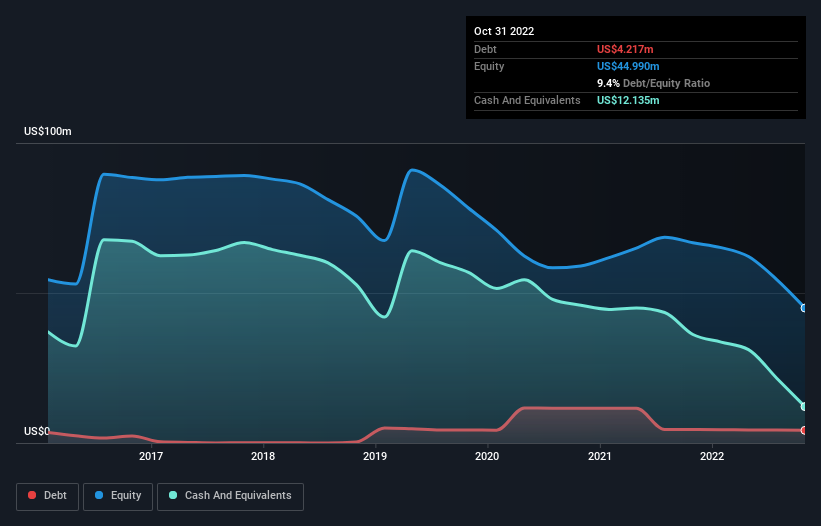
David Iben put it well when he said, 'Volatility is not a risk we care about. What we care about is avoiding the permanent loss of capital.' It's only natural to consider a company's balance sheet when you examine how risky it is, since debt is often involved when a business collapses. We note that Enzo Biochem, Inc. (NYSE:ENZ) does have debt on its balance sheet. But is this debt a concern to shareholders?
What Risk Does Debt Bring?
Debt and other liabilities become risky for a business when it cannot easily fulfill those obligations, either with free cash flow or by raising capital at an attractive price. In the worst case scenario, a company can go bankrupt if it cannot pay its creditors. However, a more usual (but still expensive) situation is where a company must dilute shareholders at a cheap share price simply to get debt under control. Of course, the upside of debt is that it often represents cheap capital, especially when it replaces dilution in a company with the ability to reinvest at high rates of return. The first step when considering a company's debt levels is to consider its cash and debt together.
Check out our latest analysis for Enzo Biochem
What Is Enzo Biochem's Debt?
The image below, which you can click on for greater detail, shows that Enzo Biochem had debt of US$4.22m at the end of October 2022, a reduction from US$4.47m over a year. But on the other hand it also has US$12.1m in cash, leading to a US$7.92m net cash position.

How Strong Is Enzo Biochem's Balance Sheet?
Zooming in on the latest balance sheet data, we can see that Enzo Biochem had liabilities of US$24.3m due within 12 months and liabilities of US$16.0m due beyond that. On the other hand, it had cash of US$12.1m and US$11.5m worth of receivables due within a year. So its liabilities outweigh the sum of its cash and (near-term) receivables by US$16.6m.
Enzo Biochem has a market capitalization of US$69.7m, so it could very likely raise cash to ameliorate its balance sheet, if the need arose. However, it is still worthwhile taking a close look at its ability to pay off debt. Despite its noteworthy liabilities, Enzo Biochem boasts net cash, so it's fair to say it does not have a heavy debt load! The balance sheet is clearly the area to focus on when you are analysing debt. But you can't view debt in total isolation; since Enzo Biochem will need earnings to service that debt. So when considering debt, it's definitely worth looking at the earnings trend. Click here for an interactive snapshot.
Over 12 months, Enzo Biochem made a loss at the EBIT level, and saw its revenue drop to US$99m, which is a fall of 15%. We would much prefer see growth.
So How Risky Is Enzo Biochem?
Statistically speaking companies that lose money are riskier than those that make money. And the fact is that over the last twelve months Enzo Biochem lost money at the earnings before interest and tax (EBIT) line. And over the same period it saw negative free cash outflow of US$22m and booked a US$27m accounting loss. But the saving grace is the US$7.92m on the balance sheet. That means it could keep spending at its current rate for more than two years. Overall, we'd say the stock is a bit risky, and we're usually very cautious until we see positive free cash flow. The balance sheet is clearly the area to focus on when you are analysing debt. But ultimately, every company can contain risks that exist outside of the balance sheet. For example Enzo Biochem has 3 warning signs (and 1 which shouldn't be ignored) we think you should know about.
At the end of the day, it's often better to focus on companies that are free from net debt. You can access our special list of such companies (all with a track record of profit growth). It's free.
If you're looking to trade Enzo Biochem, open an account with the lowest-cost platform trusted by professionals, Interactive Brokers.
With clients in over 200 countries and territories, and access to 160 markets, IBKR lets you trade stocks, options, futures, forex, bonds and funds from a single integrated account.
Enjoy no hidden fees, no account minimums, and FX conversion rates as low as 0.03%, far better than what most brokers offer.
Sponsored ContentValuation is complex, but we're here to simplify it.
Discover if Enzo Biochem might be undervalued or overvalued with our detailed analysis, featuring fair value estimates, potential risks, dividends, insider trades, and its financial condition.
Access Free AnalysisHave feedback on this article? Concerned about the content? Get in touch with us directly. Alternatively, email editorial-team (at) simplywallst.com.
This article by Simply Wall St is general in nature. We provide commentary based on historical data and analyst forecasts only using an unbiased methodology and our articles are not intended to be financial advice. It does not constitute a recommendation to buy or sell any stock, and does not take account of your objectives, or your financial situation. We aim to bring you long-term focused analysis driven by fundamental data. Note that our analysis may not factor in the latest price-sensitive company announcements or qualitative material. Simply Wall St has no position in any stocks mentioned.
About NYSE:ENZ
Enzo Biochem
A life sciences company, engages in the labeling and detection technologies from DNA to whole cell analysis in the United States and internationally.
Flawless balance sheet slight.
Similar Companies
Market Insights
Community Narratives



